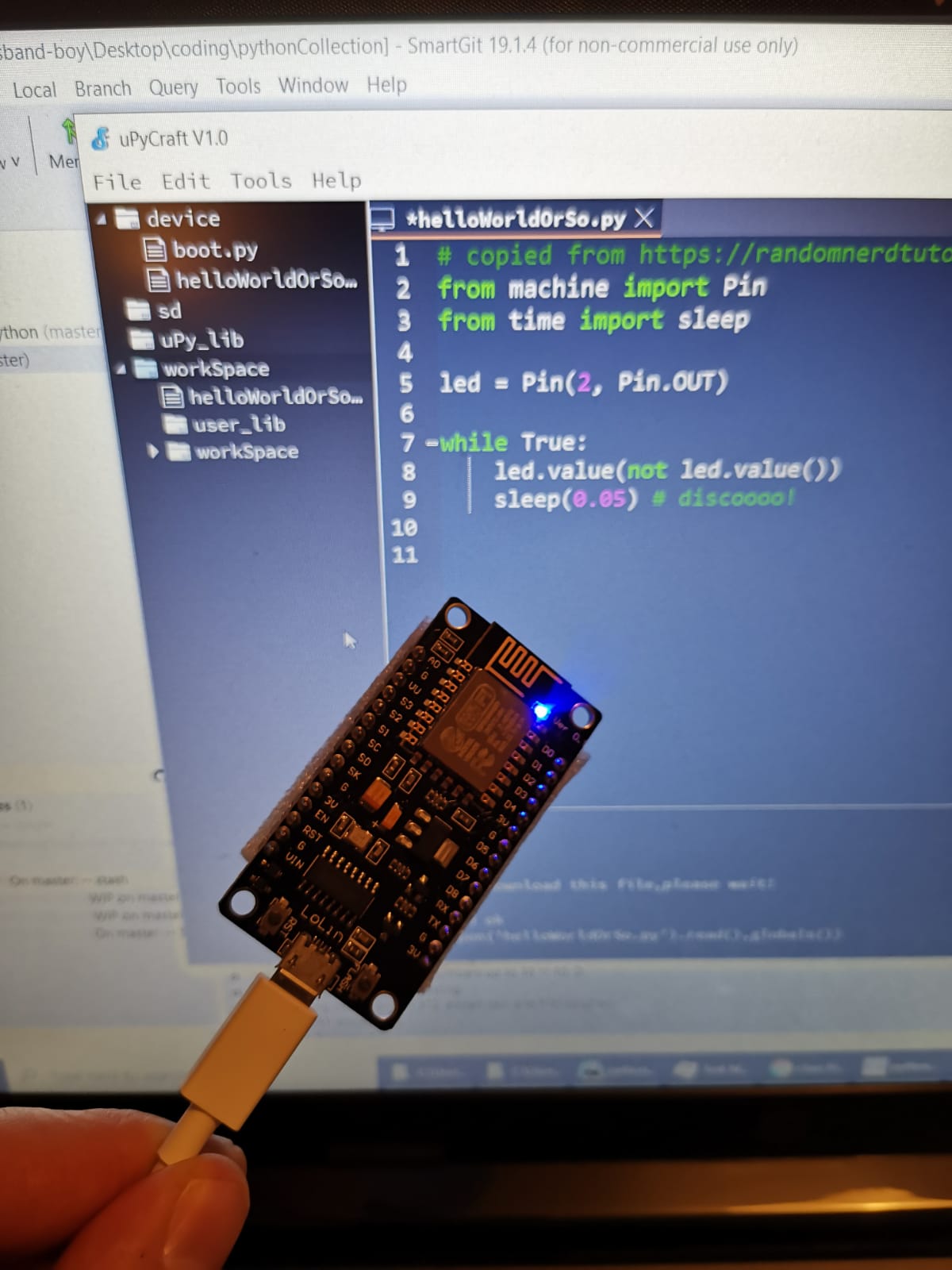MicroPython (uPython) – the future is here
My activity with the ESP8266/ESP32 boards had somehow fallen asleep after I set up one of the ESP8266 as Wifi-repeater. It worked, but creating own devices was too cumbersome. Firing up the ArduinoStudio took ages, building and downloading the firmware in C++ was error-prone, took ages (seriously, this is a tiny program, what the hell happens in the background?).
But I knew there exists a path, which could save some time: µPython (micropython). It runs a firmware, you just deploy your “code”. In my case now a tiny hello-world-like program.
I used this and that tutorial and the uPyCraft-IDE. Got it working with an ESP8266 in minutes.

Seriously: goodbye crappy, non-structured and slow-to-build C/C++ for my microcontrollers. The future is here o/
By the way: the motivation also comes from my current daily practice of Python (of course, I still contribute to C++/Qt-based projects), but my current flame is Python (for Project Euler and daily coding challenges).

C++ name demangling
Like described in “Today I learned” (TIL): c++filt is quite helpful for demangling:
But what if you have none readily available? -> c++filtjs
Three ways to find the location of a certain DLL at Windows
Common problem: just using the current working directory is not sufficient, because especially for unit-tests started from the Visual Studio-testrunner the opriginal, relative path is not fitting anymore. Fallback would be check an environment variable , which is set during installation or using the WinAPI (ugh).
versioned code can be found at: github/cppcCollection
|
1 2 3 4 5 6 7 8 9 10 11 12 13 14 15 16 17 18 19 20 21 22 23 24 25 26 27 28 29 30 31 32 33 34 35 36 37 38 39 40 41 42 43 44 45 46 47 48 49 50 51 52 53 54 55 56 57 58 59 60 61 62 63 64 65 66 67 68 69 70 71 72 73 74 75 76 77 78 79 80 81 82 83 84 85 86 87 88 89 90 91 92 93 94 95 96 97 98 |
// +++ ATTENTION! +++ // This is just a snippet to show how to get the path for a certain DLL on the Windows-platform. // First absed on the "current working directory", then the environment variable "PATH", then via WinAPI-call. // Of course, this does not work for any other OS. Nor is this epxected to survive any Windows-makeover (or patch set :X) // +++ ATTENTION! +++ #if defined(Q_OS_WIN) || defined(Q_OS_CYGWIN) // for the plugin-path #include <windows.h> #include <libloaderapi.h> #endif bool properSdkPath(QString const path) { #if defined(Q_OS_WIN) || defined(Q_OS_CYGWIN) // Check for the existance of a very, very, very important DLL. return QFileInfo(path + "/SDK.dll").exists(); #endif #ifdef Q_OS_MAC // macOS has SDK-support, so using the current application-path is sufficient return true; #endif } // Return the path to the hardware-plugins. // First check is based on the current working directory. // If this fails, check the contents of the environment-variable 'PATH' (set at install time). // If this fails, then check via Win-API. QString getPluginPath() { QString pathToSDK; // Try first the current working directory pathToSDK = QCoreApplication::applicationDirPath(); #if defined(Q_OS_WIN) || defined(Q_OS_CYGWIN) // If this failed (has no SDK.dll), indagnate the PATH environment variable. // Which is set during installation. if(!properSdkPath(pathToSDK)) { // Get the directory from the PATH (is set during APPLICATION SDK installation). auto const path = QString::fromLocal8Bit(qgetenv("PATH")); auto const splitPath = path.split(";", QString::SkipEmptyParts); for(auto const& item : splitPath) { if(item.contains("APPLICATION SDK")) { pathToSDK = QFileInfo(item).absoluteFilePath(); break; } } // If even this failed, then fall back to GetModuleFileName (happens with VS-testrunner). if(!properSdkPath(pathToSDK)) { // get the handle of the DLL HMODULE handleModule = GetModuleHandleA("SDK.dll"); LPWSTR modulePath = nullptr; DWORD bufLen = 4096; // reserve enough memory if(!(modulePath = (TCHAR*)malloc(sizeof(TCHAR) * (size_t)bufLen))) { TRACE_INFO("Could not allocate 4 KB memory. Please consider an hardware upgrade.") } // retrieve the path DWORD pathSize = 4096; pathSize = GetModuleFileName(handleModule, modulePath, pathSize); if(pathSize) { QString outputPath = QString::fromWCharArray(modulePath, static_cast<int>(pathSize)); pathToSDK = outputPath.replace("SDK.dll", ""); } else { TRACE_INFO("GetModuleFileName failed:" << GetLastError()); } } } #endif if(!properSdkPath(pathToSDK)) { TRACE_INFO("Could not determine proper plugin-path."); pathToSDK.clear(); // reset } // convert to proper separators and append the suffix for the plugin-location QString const hardwarePluginPath = QFileInfo(pathToSDK).filePath() + "/Plugins"; return hardwarePluginPath; } |